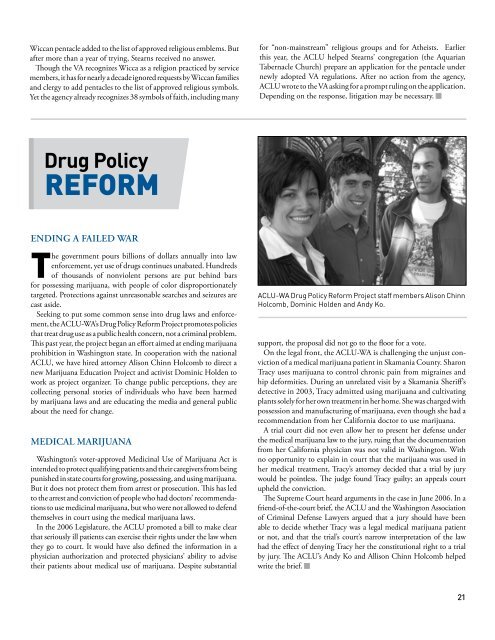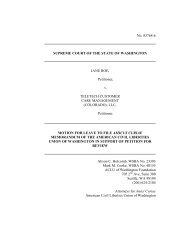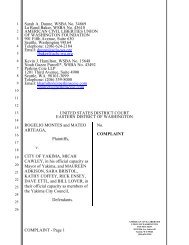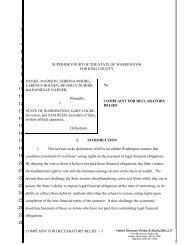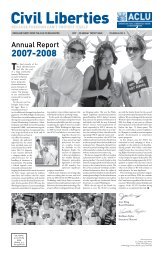ACLU-WA 2005-06 Annual Report - ACLU of Washington
ACLU-WA 2005-06 Annual Report - ACLU of Washington
ACLU-WA 2005-06 Annual Report - ACLU of Washington
Create successful ePaper yourself
Turn your PDF publications into a flip-book with our unique Google optimized e-Paper software.
Wiccan pentacle added to the list <strong>of</strong> approved religious emblems. But<br />
after more than a year <strong>of</strong> trying, Stearns received no answer.<br />
Though the VA recognizes Wicca as a religion practiced by service<br />
members, it has for nearly a decade ignored requests by Wiccan families<br />
and clergy to add pentacles to the list <strong>of</strong> approved religious symbols.<br />
Yet the agency already recognizes 38 symbols <strong>of</strong> faith, including many<br />
for “non-mainstream” religious groups and for Atheists. Earlier<br />
this year, the <strong>ACLU</strong> helped Stearns’ congregation (the Aquarian<br />
Tabernacle Church) prepare an application for the pentacle under<br />
newly adopted VA regulations. After no action from the agency,<br />
<strong>ACLU</strong> wrote to the VA asking for a prompt ruling on the application.<br />
Depending on the response, litigation may be necessary.<br />
Drug Policy<br />
REFORM<br />
ENDING A FAILED <strong>WA</strong>R<br />
The government pours billions <strong>of</strong> dollars annually into law<br />
enforcement, yet use <strong>of</strong> drugs continues unabated. Hundreds<br />
<strong>of</strong> thousands <strong>of</strong> nonviolent persons are put behind bars<br />
for possessing marijuana, with people <strong>of</strong> color disproportionately<br />
targeted. Protections against unreasonable searches and seizures are<br />
cast aside.<br />
Seeking to put some common sense into drug laws and enforcement,<br />
the <strong>ACLU</strong>-<strong>WA</strong>’s Drug Policy Reform Project promotes policies<br />
that treat drug use as a public health concern, not a criminal problem.<br />
This past year, the project began an effort aimed at ending marijuana<br />
prohibition in <strong>Washington</strong> state. In cooperation with the national<br />
<strong>ACLU</strong>, we have hired attorney Alison Chinn Holcomb to direct a<br />
new Marijuana Education Project and activist Dominic Holden to<br />
work as project organizer. To change public perceptions, they are<br />
collecting personal stories <strong>of</strong> individuals who have been harmed<br />
by marijuana laws and are educating the media and general public<br />
about the need for change.<br />
MEDICAL MARIJUANA<br />
<strong>Washington</strong>’s voter-approved Medicinal Use <strong>of</strong> Marijuana Act is<br />
intended to protect qualifying patients and their caregivers from being<br />
punished in state courts for growing, possessing, and using marijuana.<br />
But it does not protect them from arrest or prosecution. This has led<br />
to the arrest and conviction <strong>of</strong> people who had doctors’ recommendations<br />
to use medicinal marijuana, but who were not allowed to defend<br />
themselves in court using the medical marijuana laws.<br />
In the 20<strong>06</strong> Legislature, the <strong>ACLU</strong> promoted a bill to make clear<br />
that seriously ill patients can exercise their rights under the law when<br />
they go to court. It would have also defined the information in a<br />
physician authorization and protected physicians’ ability to advise<br />
their patients about medical use <strong>of</strong> marijuana. Despite substantial<br />
<strong>ACLU</strong>-<strong>WA</strong> Drug Policy Reform Project staff members Alison Chinn<br />
Holcomb, Dominic Holden and Andy Ko.<br />
support, the proposal did not go to the floor for a vote.<br />
On the legal front, the <strong>ACLU</strong>-<strong>WA</strong> is challenging the unjust conviction<br />
<strong>of</strong> a medical marijuana patient in Skamania County. Sharon<br />
Tracy uses marijuana to control chronic pain from migraines and<br />
hip deformities. During an unrelated visit by a Skamania Sheriff’s<br />
detective in 2003, Tracy admitted using marijuana and cultivating<br />
plants solely for her own treatment in her home. She was charged with<br />
possession and manufacturing <strong>of</strong> marijuana, even though she had a<br />
recommendation from her California doctor to use marijuana.<br />
A trial court did not even allow her to present her defense under<br />
the medical mari juana law to the jury, ruing that the documentation<br />
from her California physician was not valid in <strong>Washington</strong>. With<br />
no opportunity to explain in court that the marijuana was used in<br />
her medical treatment, Tracy’s attorney decided that a trial by jury<br />
would be pointless. The judge found Tracy guilty; an appeals court<br />
upheld the conviction.<br />
The Supreme Court heard arguments in the case in June 20<strong>06</strong>. In a<br />
friend-<strong>of</strong>-the-court brief, the <strong>ACLU</strong> and the <strong>Washington</strong> Association<br />
<strong>of</strong> Criminal Defense Lawyers argued that a jury should have been<br />
able to decide whether Tracy was a legal medical marijuana patient<br />
or not, and that the trial’s court’s narrow interpretation <strong>of</strong> the law<br />
had the effect <strong>of</strong> denying Tracy her the constitutional right to a trial<br />
by jury. The <strong>ACLU</strong>’s Andy Ko and Allison Chinn Holcomb helped<br />
write the brief.<br />
21


